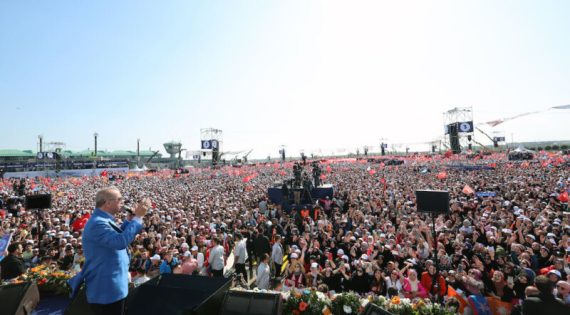W
hy are foreign observers viewing Turkey’s 2023 elections as the most important election in the world this year? This question becomes even more interesting given the fact that the AK Party has so far won 15 different elections in 21 years. Thus, the question now is how a political party that has remained in power for so long can still make promises that attract the attention of millions of voters. Where does the AK Party’s strength to offer Turkey new highs come from? Let’s try to answer these questions.
In the past, the opposition circles would ponder the question “Which rabbit will Erdoğan pull out of the hat in this election?” In recent years, this question became “Will Erdoğan be able to pull a rabbit out of a hat?” Above all, there is one fundamental point that should be underlined about voter behavior: when voting for a party, voters do not look at the rabbit that comes out of the hat. That is just an illusion which veils reality. If voters were to vote for a gimmick, political parties would remain in power for a maximum of one term.
For a political party that has been in power for a long time, preparing for elections is not limited to making promises, putting forward an election manifesto, holding crowded rallies, and advertising in the media. Such efforts are undoubtedly necessary, and voters cannot be motivated and consolidated without them. However, such ad hoc practices do not win elections. Rather voters silently observe the practices of political parties and leaders from the past to the present.
Political parties and voters
Political parties, whether in power or in opposition, may occasionally pursue flawed policies. They may offend a section of the electorate, leading dissatisfied voters to distance themselves from the party. The alienated electorate may even feel anger. When a voter group becomes angry with their party, it is often because of the affectional bond that connects them. A common finding of opinion polls reveals that when voters are “undecided” it is because they are angry with the policies of their party.
Voters who once felt a sense of belonging to a party, voted for it, and even embraced that party’s worldview as part of their own identity, expect their party to resolve the cause of their dissatisfaction before the ballot boxes open. Even if the disappointment is about critical policies and political actors, they want to vote for “their” party with confidence.
On the other hand, research shows that voters who feel anger towards their “own” party criticize the opposing party, its leader, and its policies more harshly, almost to the point of hate speech. Another reason for this is to legitimize their vote for their party, even if they criticize it, and to ease their conscience and mind.
During election periods, parties’ declarations, policy updates, and promises are meant to motivate their existing voters, to regain those who have distanced themselves from their party, and to gain new voters. Depending on political conditions and sociological changes, voters’ expectations and demands from politics also change.
Political parties survive if they adapt their policies to the new conditions. Between 2002 and 2023, the sociopolitical and economic conditions have considerably changed both within Turkey and in the world at large, thus also changing the conditions that first carried the AK Party to power in 2002.
Continuity and Change in Election Declarations
The AK Party’s first election manifesto was titled “Everything is for Turkey.” Voters were distrustful of the then existing parties as election promises in the 1990s were marketed through “bubble politics.” Trust in politicians and politics had declined and the country’s long-accumulated problems were deepening. The governments could neither solve the existing problems nor offer a future vision.
In this hopeless environment, the AK Party’s manifesto focused on urgent action plans, aimed at restoring trust between politics and society, was committed to expanding the political space through democratic moves, and promised to eliminate obstacles to liberties.
Prior to the 2007 elections in Turkey, the then ruling AK Party was under massive pressure from the centers of the military, media, and Kemalist elite tutelage. The AK Party had prepared an election manifesto that promised, first, to remove this coordinated tutelage in the upcoming elections, and second, to continue the structural transformations it had initiated such as expanding the space for democratic politics and continuing reforms on the road to a new constitution. Therefore, the election manifesto was titled “With Security and Stability, There’s No Rest for the Weary.”
2011 onwards
In the period leading up to the 2011 elections, Turkey was at a critical threshold. Considerable progress had been made in the fight against the tutelage mentioned above, and structural, legal, and institutional arrangements had been made to rehabilitate the political sphere. Laws had been enacted to remove obstacles to freedoms and a “national unity and solidarity” initiative had been launched to solve persisting problems. The “New Turkey Contract: 2023” vision was put forward in the 2011 election manifesto. This declaration defined not only an election period but also the basic paradigm and parameters of politics until 2023. Every election manifesto or vision to be announced in the following periods would be based on the 2011 manifesto, revised and updated with new proposals.
The post-2011 period was another critical threshold for the guardians of the old order, who showed a strong and organized resistance. By taking political risks, the AK Party government tried expanding the scope of freedoms, increasing the welfare of citizens through economic development, and solving long-ignored and gangrened problems such as the Peace Process, the Alevi Opening, the granting of rights to non-Muslim minorities, etc. The government adopted a discourse of stronger democratic values and more human rights, a fight that was ongoing since 2002.
However, this fight came up against a series of strong undemocratic reactions from 2013 onwards. The process started with the violent Gezi Park protests and continued with the truck conspiracy targeting Turkey’s National Intelligence Organization, the December 17-25, 2013 judiciary coup attempt by members of the Fetullah Terrorist Organization (FETO) who were embedded in the judiciary, the October 6-7, 2014 incidents, the trench and pit terrorism that ended the Peace Process, and, finally, the July 15, 2016 failed military coup attempt by FETO.
Starting in the 2015 elections, the AK Party began emphasizing “defensive reforms” that would counteract the adverse attempts launched since 2013 that targeted the state’s institutional capacity and reverse the effects if these attempts through “transformative reforms.” Therefore, the party prioritized system change and the restructuring of the state became an imperative. Both the 2015 and 2018 election manifestos were shaped by this approach.
A New Critical Threshold for the AK Party
On the road to the 2023 elections, the AK Party government has counterbalanced the destabilizing efforts that have been occurring since 2013 and fulfilled its 2011 election promises by focusing on development, service, and investment-oriented policies. The government was successful in reforms restructuring the state mechanism. As a result, the elections marking the centennial of the Republic of Turkey represent a new critical threshold for the AK Party. This new era marks a period in which the AK Party government could complete projects that it has already initiated and achieve new reforms. In this sense, an election manifesto based on the need for supplementary policies in every field was necessary.
All AK Party election manifestos are revised according to Turkey’s changing conditions, sociopolitical demands, and expectations. The manifestos include big projects that will attract the attention of voters. Extensive lists of realized and ongoing projects are presented to the electorate.
The AK Party’s 2023 election manifesto has a broad content. It consists of 6 chapters, 23 titles, and a total of 481 pages. Under each heading, an inventory of what the AK Party has done from past to present is offered followed by future projections. There are significant differences between the manifesto prepared by the AK Party, which has been in power for 21 years, and those prepared by other political parties.
Voters question whether ruling parties have fulfilled the promises they made in the previous election, while the opposition parties’ promises are forgotten by the next election. Opposition parties seem to prioritize bubble politics, characterized by populist promises. Since the AK Party is aware of this reality, in its most recent election manifesto, it reminds voters of everything it has achieved so far with the slogan “What we have done is the guarantee of what we will do.” This reminder also creates a concrete framework to convince voters that new promises have been made and that they will kept.
Recommended
Voters are not expected to be aware of all the issues covered in election manifestos. In any case, voters are not going to read a 481-page-long election manifesto cover to cover. Election manifestos are mostly intended for the media, international circles, and the party’s organizations. The AK Party’s 2023 election manifesto is not limited to one election period, and was prepared considering the centennial anniversary of the Republic. Just as the 2011 election manifesto laid out a vision for 2023, this manifesto also sets out long-term goals.
In short, election manifestos are not about rabbit tricks and other such gimmicks. One should look at the extent to which the vision, promises, and future perspectives set out in a manifesto reflect the expectations of the electorate, the extent to which a party is aware of the conjuncture the country and the world are experiencing, and finally, which promises are concrete and realizable.
Given that the AK Party has won 15 different elections, it makes more sense for voters to believe that it has been in power for 21 years because it has managed change well, has met society’s demands, and responded to world crises. The answer to the question “What are the AK Party’s promises to the electorate?” lies in the political capital of the political party that has been in power for 21 years and the policies it has implemented.





